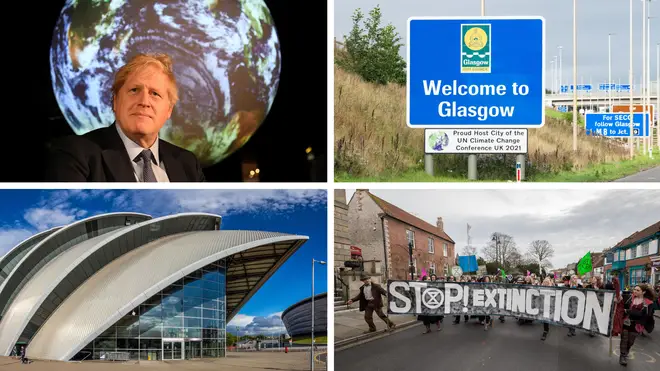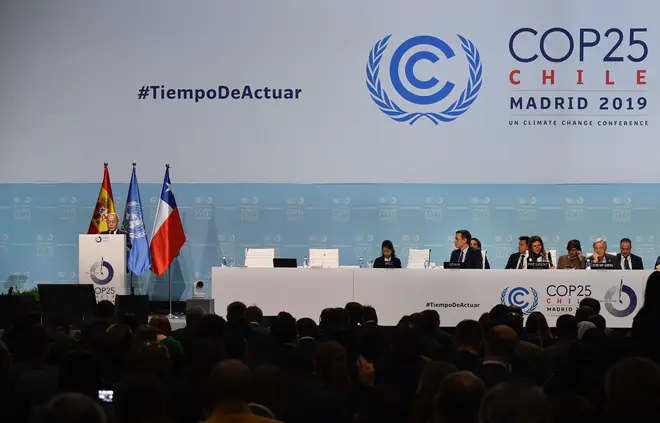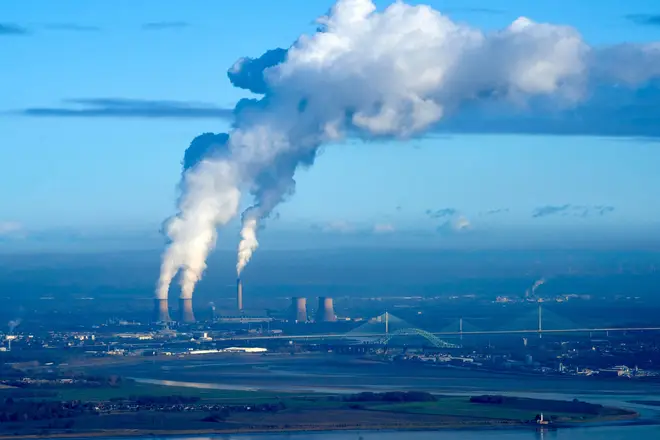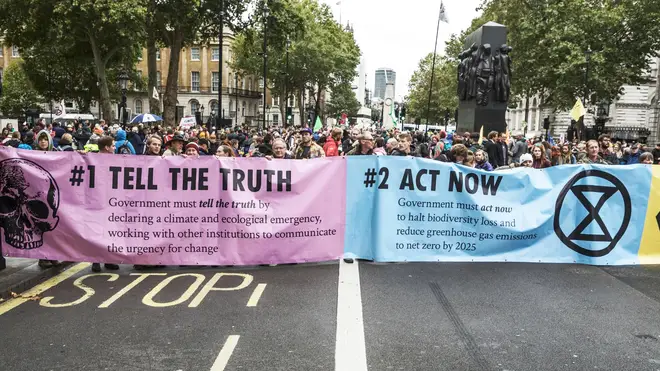
James O'Brien 10am - 1pm
25 October 2021, 15:11 | Updated: 10 November 2021, 14:54

Up to 25,000 world leaders, negotiators and journalists will gather in Glasgow at the end of this month for a key climate summit - but what is COP26 and why does it matter?
COP26 is the United Nations' annual climate change conference.
It is the 26th meeting of the signatories of the United Nations Framework Convention on Climate Change (UNFCCC), which is a treaty, agreed in 1994, between 196 countries and the EU.
The signatories are known as the 'parties', hence the name - 'COP' stands for Conference of the Parties.
It was due to take place last year, but it was delayed because of the coronavirus pandemic.

COP26 runs for nearly two weeks, beginning on Sunday October 31 and finishing on Friday November 12 - although in previous years talks have overrun, meaning this year's conference is likely to extend over the weekend.
Around 25,000 people in total are expected to attend COP26.
More than 120 world leaders - including UK Prime Minister Boris Johnson and US President Joe Biden - will gather in the first few days, before departing to leave environment ministers or similar officials to do the complex negotiating.
The Queen was originally due to attend the conference but on Tuesday Buckingham Palace announced she would not, after spending a night in hospital and being advised to rest by doctors.
Prince Charles, Camilla, Prince William and Kate Middleton are still due to attend.
Read more: Biden pledges extra $11bn for poorer countries to tackle climate crisis
Also due to attend is Sir David Attenborough, who has been named the People's Advocate of COP26.

What is COP26?
Some key leaders have already said they will not be attending, including Russian President Putin and Xi Jinping, the President of China. The latter country is the world's biggest emitter of greenhouse gases, and has a history of failing to prioritise climate issues. As a result the President's non-attendance is a major hurdle for COP26's aims, although leaders have said talks could still be successful without him.
The Paris agreement
A key point of discussion at COP26 will be the Paris agreement.
The Paris agreement was signed by 196 parties at COP21 in 2015. It is an agreement to, among other things, limit global warming to well below 2C - ideally 1.5C - compared to pre-industrial levels.
Whilst the goals are legally-binding, the individual actions agreed by countries to enable them to reach the target are not. The way the Paris agreement works is that every five years countries must present renewed, increasingly ambitious commitments - known as nationally determined contributions (NDCs) - to ensure they are on track to meet the goals of the Paris agreement. Because of the delay to the conference caused by Covid-19, these NDCs are due in 2021, at COP26.
Read more: UN climate change report: What does it say? And why are there concerns?
This is particularly important as we are currently not on track to hit the goals in the Paris agreement. A UN report published on Monday confirmed that, even with the promises already made, we are still heading for an average global temperature increase of 2.7C, well above the target of 1.5C. This makes the renewed pledges of countries all the more pivotal.

Adapting to climate change
Delegates will also discuss how to help communities and ecosystems cope with a climate that is already changing.
The climate system is incredibly complex, and often the impacts of climate change - for example, melting polar ice caps - play a role in further warming. This positive feedback means that, even if we cut out fossil fuels tomorrow, it would be a while before our planet stopped heating up and the climate returned to 'normal'. Because of this it is important to shield communities and ecosystems from the impacts of climate change alongside the measures being taken to limit warming.
In practise, this adaption could include investment in flood defences or details about how countries plan on protecting their natural habitats.
Read more: 'Adapt or die': England faces devastating floods like Germany, climate experts warn
Mobilising finance
Both preventing climate change and managing the impacts of it cost countries money.
Developing countries - who generally contribute the least to causing climate change but are among those most vulnerable to its impacts - in particular will need financial support. COP26 will likely include discussions on how the enormous costs of tackling and adapting to climate change will be met across the globe.
COP15 - held in Copenhagen in 2009 - saw a target agreed that promised poor countries they would receive $1bn a year by 2020. However this target has been missed, with about $80bn being provided last year. On Monday, less than a week before the summit, the target for this pledge was pushed back to 2023.

Cop26 Five graphs that show the reality of climate change
Despite the name, COP26 is not just about the parties - there are a number of other things planned.
There are two zones at a COP - the Blue Zone and the Green Zone. The Blue Zone is where all the political drama happens. It's where world leaders and officials meet for negotiations, consultations and technical briefings, and is only open to these officials, members of the media and a select few from other organisations.
The Green Zone, however, is for the general public. There will be a range of events throughout the fortnight including workshops and presentations, as well as cultural events such as music performances and art installations.
Read more: UK unveils new climate target to cut emissions by 68% by 2030
Read more: Climate crisis: Human-caused damage could be irreversible for centuries - UN report
Tickets for Green Zone events are free and available online. There are also a range of virtual events open to the general public.
Yes. Saturday November 6 has been designated the Global Day for Climate Justice. Around 100,000 people from approximately 100 organisations are expected to descend on Glasgow. Members of the public are also invited to join.

However, there are likely to be protests on other days too. Extinction Rebellion are staging a procession through the city on Saturday October 30, and there is a vigil organised by Interfaith Glasgow scheduled for October 31. There is also a School Strike for Climate march in Glasgow on November 5.
School Strike for Climate, November 5th. Join us to hold world leaders accountable and be as loud as possible about climate justice. #FridaysForFuture pic.twitter.com/HvnlgO3HRn
— Fridays For Future Glasgow (@FFF_Glasgow) October 12, 2021
With the stakes so high and the deadlines creeping ever closer, many wonder why, after 25 meetings of COP delegates, we are still not in a position where warming has been halted, or why we don't have concrete, achievable targets in place to limit climate change to within 1.5C.
Read more: Build back better: 'Blah blah blah' - Greta takes aim at world leaders in climate speech
Read more: PM tells humanity to 'grow up' and references Kermit the Frog in key UN climate speech
Politically, climate change is an incredibly thorny issue. The change required is enormous, and costs a huge amount of money. As well as this, there are ethical questions - why should developed countries cut down on fossil fuels, therefore limiting their ability to achieve economic growth in the way developed countries already have? Getting 196 nations to agree on something so contentious - especially when scientists do not have a full understanding of the climate system and what the impacts of climate change could be - is never going to be easy.

Boris Johnson: 'Cop26 is a turning point for the world'
The decision to hold the event in person was made because there was a worry that countries could evade responsibility if the conference was virtual, resulting in little progress being made. However thousands of people, from hundreds of different countries, gathering in one place may ring alarm bells for some.
A number of things are being done to mitigate the threat of the virus. Delegates have been offered vaccinations by the UK government, and there will be a rigorous test, trace and isolate programme. Delegates from red list countries will be required to isolate before attending the conference.
Previously, some COPs have been a success. The Paris COP in 2015 saw - for the first time ever - almost every country enter into a legally-binding commitment to reduce emissions. However, others, such as Copenhagen in 2009, were significantly less so.
There are hopes that COP26 could be a pivotal moment in the world's response to the climate crisis - but whether this is actually the case remains to be seen.